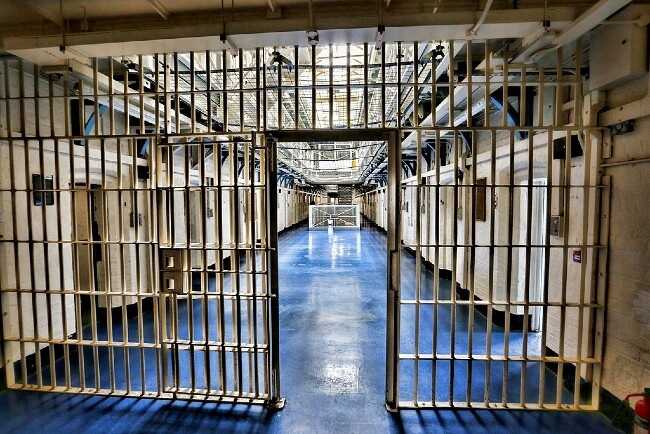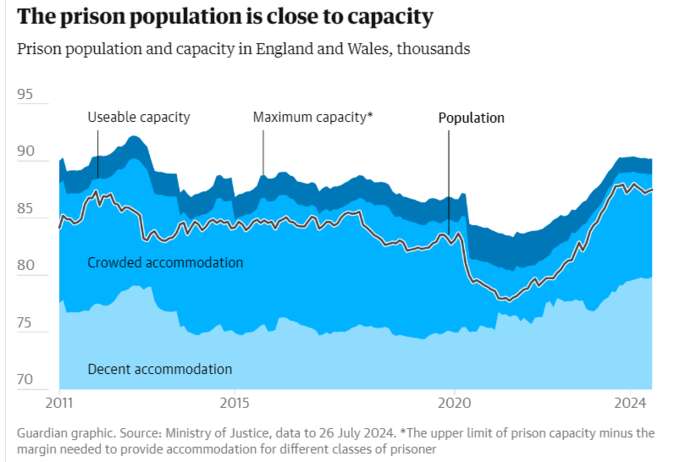Prison crowding emergency measures described as a ’sticking plaster,’ Starmer told

Ministers activate Operation Early Dawn, so defendants can be held in police cells as more are sentenced over riots
Ministers have been warned that they have placed a “sticking plaster” over a crumbling criminal justice system after emergency measures were activated to ease prison overcrowding, as more people are sentenced for their role in the recent riots.
The longstanding measures, known as Operation Early Dawn, allow defendants to be held in police cells until prison places become available and could mean their court dates are delayed or adjourned at short notice.
The system was activated on Monday morning and means some defendants across the north of England and the Midlands waiting for court appearances will be kept in police cells until prison space is available.
Keir Starmer defended the move, saying ministers were making “really tough decisions, and nobody wants to take them”. He said Labour had inherited problems with prisons due to a “basic failure” by the previous Conservative administration to have enough prison places available.
As of Friday, more than 300 people had been remanded in custody for their role in the violent disorder that erupted after the Southport stabbings on 29 July, with 460 arrests. Many more are expected to be arrested and charged as police leaders have vowed to track down offenders for “as long as it takes”.
Michelle Heeley KC, a lawyer and the leader of the Midland circuit, said: “We recognise that the government is taking much-needed action, but this is just a sticking plaster for a long-term problem.”

Mark Fairhurst, the national chair of the Prison Officers’ Association, told BBC Breakfast that the policy would lead to “justice delayed”. He said the most serious offenders would still end up in court and be guaranteed a prison cell, but less serious offenders would either spend longer in police cells or be bailed.
“It’s justice delayed at the moment, because we’re now clogging up police cells, so they might have to delay some of their operations,” he said.
Tom Franklin, the chief executive of the Magistrates’ Association, said: “Every case that is delayed has real-life consequences for victims, witnesses and defendants and leads to magistrates and court staff sitting around waiting rather than administering justice.”
The Ministry of Justice (MoJ) has had to bring forward the use of 567 new prison cells that were earmarked to open at the end of this month to cope with the extra demand. From 10 September, thousands of prisoners will start being released 40% of the way through their sentence as part of emergency measures announced last month. The government said its action to “tackle violent thuggery on our streets” had “exacerbated longstanding capacity issues in our prisons”.
James Timpson, the prisons minister, said: “We inherited a justice system in crisis and exposed to shocks. As a result, we have been forced into making difficult but necessary decisions to keep it operating.”
He said the emergency measures would help “manage the pressure felt in some parts of the country”. He added that anyone who posed a risk to the public “will not be bailed” and the police’s ability to arrest criminals would not be affected.
In May, Operation Early Dawn was triggered in London and north-east England before being rolled out across England after concerns over prison overcrowding. During the same month, police were instructed to consider making fewer arrests because of the lack of space in prisons.
The scheme is overseen by the MoJ and therefore could be used across England and Wales. On this occasion, the measure will be put in place in the north-east of England and Yorkshire; Cumbria and Lancashire; in the Manchester, Merseyside and Cheshire regions, and the East and West Midlands.
Speaking in Belfast, Starmer said: “We’ve been able to prove that if you commit disorder, you can expect to be put through the criminal justice system quickly, and we will continue in that vein. But I’m not going to pretend that this isn’t a challenge. We will take the necessary tough decisions on this, but we should never, ever have been put in the position that we’re in today.”
It has emerged that some criminals who have been freed early to cut prison overcrowding have returned to jail. The chief inspector of prisons, Charlie Taylor, said a quarter of prisoners freed from HMP Nottingham under the previous government’s early release scheme were homeless when they left jail, resulting in “inevitable recalls”.
The early release scheme, known as end-of-custody supervised licence (ECSL), was brought in by Rishi Sunak’s Conservative administration last year in an attempt to ease prison overcrowding.
In a report published on Monday, Taylor said preparation for release at the East Midlands category B reception prison was “often chaotic and rushed” despite staff “doing their best”.
“A quarter of prisoners released on this scheme (ECSL) were homeless and although data was not clear, it resulted in inevitable recalls,” he said.
Read more similar news:
Comments:
comments powered by Disqus

































